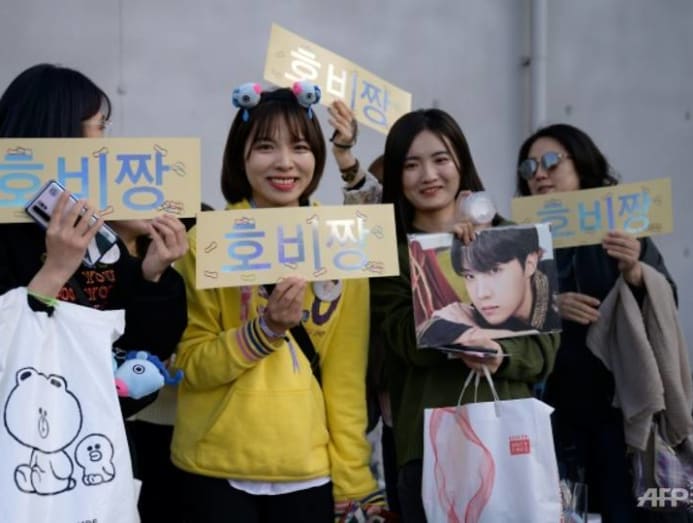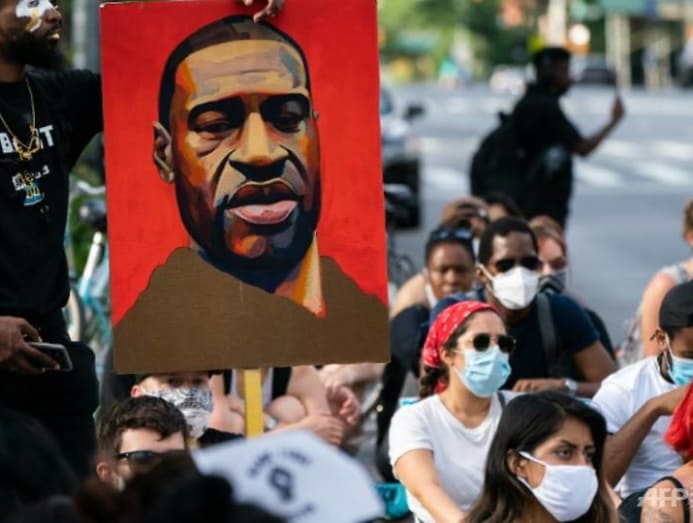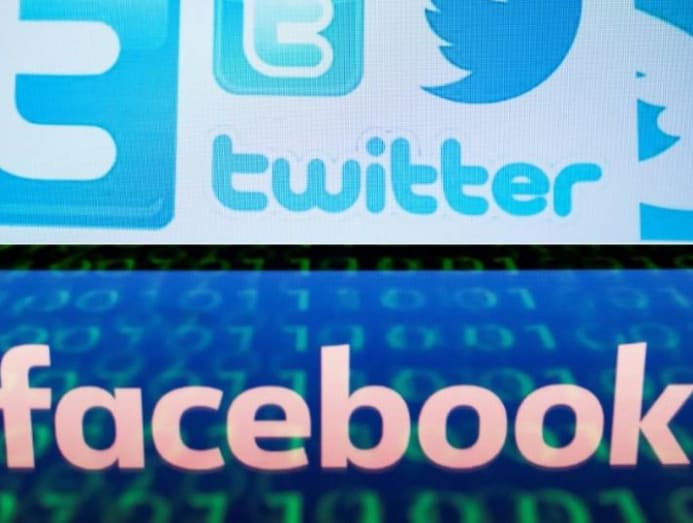Commentary: K-pop’s hardcore fans are propelling social movements, but have blind spots
SINGAPORE: As protestors in America mourned the expiry of George Floyd, the hastag #BlackLivesMatter was trending on social media platforms with solidarity posts worldwide as a protest against constabulary brutality.
The big boost for #BlackLivesMatter can be attributed to Korean popular music (K-pop) superfans, or "stans".
Using a variety of online tactics, K-pop stans worldwide drowned out hashtags associated with correct-wing causes with M-pop videos and memes.
More recently, Thou-popular stans and teenage TikTok users inflated the number of registered tickets for US President Donald Trump'due south campaign rally in Tulsa equally a prank, resulting in an underwhelming omnipresence.
What does this organic mobilisation and crowdsourcing signify, and what tin can exist inferred from the role of non-land, decentralised groups online?
READ: Online disruption of Trump rally highlights K-popular's political hustle
READ: Commentary: How world sensation BTS took K-pop fandom to a whole new level
ONLINE FANDOMS
Fandom has evolved over the decades beyond the stereotype of teenage, mostly female fans into a diverse customs with active, engaged participants.
The international popularity of Chiliad-pop has exemplified the miracle of a globalised customs with shared narratives and experiences. K-pop fandoms are fabricated upwardly of highly globalised and diversified communities online – from dissimilar races, ethnicities, ages and countries.
The identification of shared experiences builds connections between disparate people, uniting loose networks into tight communities.
A generation of fans skilled in online mobilisation, with organisational skills and a keen understanding of social media, has enabled new and ongoing efforts to showcase and boost the support of the fandom'south artistes.
This collaborative effort promotes hashtags and topics relating to the performer or fandom to trend, and likewise fosters a strong sense of social connectivity.

Thousand-pop fans are also known for being hugely supportive of charitable causes online. Online mobilisation via crowdfunding includes donating to charities and volunteering in emergency situations.
Supporting charitable causes is viewed as giving dorsum to the community and the wider club. Fans are as well motivated by the desire to make their favourite artists proud of their efforts.
Global stans of K-pop band BTS, known as Ground forces (Adorable Representative MC for Youth), accept supported more than than 630 clemency projects. For case, a group of Singapore fans of BTS has partnered with local charity Willing Hearts to raise funds for underprivileged and vulnerable Singaporeans.
READ: COVID-nineteen has shown that we tin be gracious. How exercise we brand information technology final?
A BTS fan collective, I In An ARMY, has besides encouraged fans to contribute micro-donations to non-profit initiatives in Syria and Rwanda.
K-pop fans of bands Blackpink and EXO in China contributed funds and donated medical supplies to fight against COVID-19 in Hubei province.
The fluidity and nimble responsiveness of the fandom has led to active repurposing of back up and amplification for their favourite M-pop artists to social activism campaigns – leveraging the fandom'due south digital savviness, creativity and mobilisation experience.
READ: Y'all tin now learn Korean from K-pop superstars BTS in new web series
READ: Commentary: Uptick in corporate giving during COVID-19 is much more than just a PR practice
STAN STRATEGY IN THE United states
Various strategies contributed to the scale of coordinated response online. Content spamming and trolling with fancams (short video clips of an artist dancing or singing) was predominantly used.
Fancams – traditionally shared past K-popular stans in response to unrelated social media posts to promote their favourite artists – were used against digital efforts by the police. The Dallas police department'southward iWatch app, for instance, reportedly crashed when Thousand-pop stans overwhelmed the app with fancams.
Right-wing hashtags (e.grand #whiteoutwednesday, #MAGA) were subjected to hijacking. Fancams and memes were tagged with popular right-wing hashtags, and were used to take over and drown out correct-fly narratives.

The utilize of #BlackLivesMatter farther enabled the formation of signposts in which conversations centred around the protests could exist galvanised by the international fan community.
Hashtags promoted by constabulary departments equally tip lines for data were besides taken over, causing them to trend under Twitter's K-pop label.
Stans also amplified resources shared by Black Lives Matter activists online. K-pop fan groups and accounts with huge followings (e.g. BTS, Blackpink) promoted helplines and resource. BTS stans rallied under the #MatchAMillion hashtag to raise more than than US$i meg in 25 hours to match BTS' seven-figure contribution for the Black Lives Matter movement.
READ: Commentary: Why George Floyd'southward death could tilt the US election - in Trump's favour
READ: Commentary: George Floyd's death and the rising spectre of a race-based U.s.a. election
THE DARK SIDE OF ONLINE ACTIVISM
While this has demonstrated the agility and effectiveness of social media and its galvanisation towards social activism causes, it raises questions around online mobilisation.
Ane upshot that could arise is concern about efforts by country or non-state actors to exploit a situation past using sock-puppet or bot-like accounts. These accounts could be used to disrupt, wrest back or counter trending narratives online.
Though in that location is no show that bots or sock-puppet accounts participated in #whiteoutwednesday or other affiliated hashtags, the exploitation and utilisation of such influence tactics could potentially be abused and exploited.
This approach is not novel. The United states Senate Intelligence Commission report in 2022 detailed Russian efforts to interfere with the 2022 US presidential election. It highlighted that the Internet Research Agency (IRA) utilised social-media influence campaigns to exploit and amplify existing racism and racial disharmonize in the United States.

Sock-puppet and troll accounts could bring together or insert themselves into online social groups, such as fandoms, and use imitation alibis to potentially embed themselves within the grouping, and into the greater fandom community itself.
As greater socio-political engagement and activism from fandoms increment, sock-puppet and troll accounts could potentially advance disinformation and influence campaigns to foment division and amplifying propaganda.
Business organization of overzealous fans who might take vigilantism efforts besides far have also arisen. Accounts of doxxing and spamming efforts on Twitter have occurred, and could potentially atomic number 82 to a tit-for-tat retaliatory response online.
While stan Twitter has demonstrated its effectiveness in amplifying and mainstreaming important social issues online, the question of the sustainability of such campaigns in the long run remains. A quick shift in public opinion resulting from successful campaigns runs the risk of dissipating over time.
If anything, the digital disruption displayed past M-pop stans reverberate a growing urgency for new forms of social action.
Dymples Leong is a Senior Analyst with Centre of Excellence for National Security (CENS) at the South Rajaratnam School of International Studies (RSIS), Nanyang Technological University. This commentary offset appeared on the Lowy Constitute'due south blog, The Interpreter.
Source: https://cnalifestyle.channelnewsasia.com/commentary/commentary-k-pops-hardcore-fans-are-propelling-social-movements-have-blind-spots-282501
Post a Comment for "Commentary: K-pop’s hardcore fans are propelling social movements, but have blind spots"